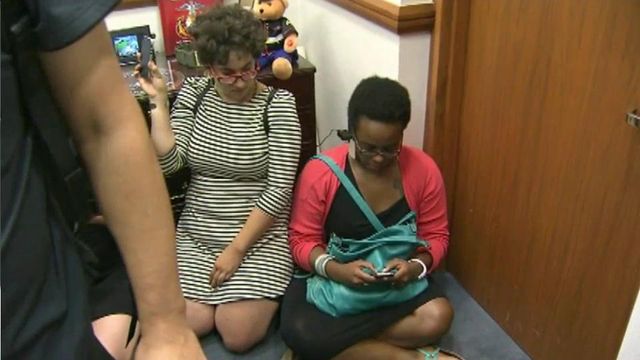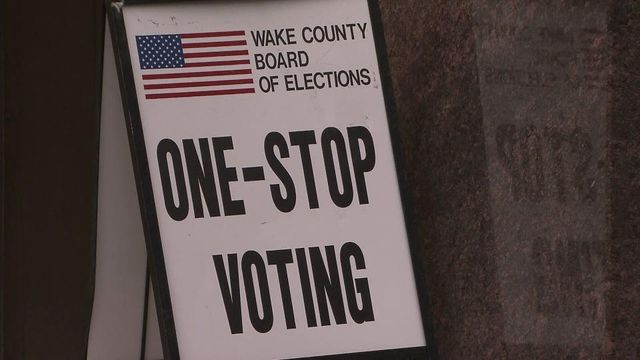Senate backs sweeping elections bill
The Senate gave key approval Wednesday to legislation that radically alters how voting will be conducted in North Carolina in future elections.
Posted — UpdatedThe extreme makeover of the bill by Senate Republicans added changes to voter registration, early voting and campaign financing, among others, and prompted a sit-in in Speaker Thom Tillis' office by protesters demanding that the proposals be scrapped.
Six people were arrested, police said.
"This bill will bring up to date an archaic and outdated election code," said Sen. Bob Rucho, R-Mecklenburg. "It will go a long way to building confidence among voters and citizens in the process."
Black lawmakers, however, suggested that it's the changes that are archaic and would thrust North Carolina back to a time when minorities were systematically prevented from voting.
"How appalling is this legislation that takes the great state of North Carolina back to the days ... of the Jim Crow South?" said Sen. Gladys Robinson, D-Guilford.
Democrats blasted the bill, which cuts the early voting period from 17 to 10 days, prohibits counties from extending early voting hours on the Saturday before Election Day to accommodate crowds and eliminates same-day voter registration during early voting.
"You are inconveniencing the people of North Carolina," said Sen. Josh Stein, D-Wake.
Stein noted that 900,000 people voted during the first week of early voting last fall, and squeezing the early voting period will create longer lines and frustrate people who want to exercise their constitutional right to vote.
He was able to win Republican backing of an amendment requiring counties to provide an equal number of hours of early voting in the 10-day period as they have had during 17 days by opening more early voting sites or keeping them open longer.
An attempt to retain the 17-day early voting period for presidential elections failed, even though Sen. Ben Clark, D-Cumberland, argued that a longer period would help military personnel, who sometimes have training activities that would make it difficult for them to get to a polling place.
Other provisions in the revamped bill include the following:
- Eliminate pre-registration for 16- and 17-year-olds, who currently can register to vote before they turn 18.
- Outlaw paid voter registration drives.
- Eliminate straight-ticket voting.
- Eliminate provisional voting if someone shows up at the wrong precinct.
- Prohibit counties from extending poll hours by one hour on Election Day in extraordinary circumstances, such as in response to long lines. Those in line at closing time would still be allowed to vote.
- Allow any registered voter of a county to challenge the eligibility of a voter rather than just a voter of the precinct in which the suspect voter is registered.
- Move the presidential primary to first Tuesday after South Carolina's primary if that state holds its primary before March 15. That would mean North Carolina would have two primaries during presidential elections.
- Study electronic filing for campaign returns.
- Increase the maximum allowed campaign contribution per election from $4,000 to $5,000.
- Loosen disclosure requirements in campaign ads paid for by independent committees.
- Repeal the publicly funded election program for appellate court judges.
- Repeal the requirement that candidates endorse ads run by their campaigns.
The voter ID requirement also is more restrictive than the proposal the House passed in April by prohibiting university students from using their college IDs.
Sen. Floyd McKissick, D-Durham, called the raft of changes "some of the worst tactics we could put together" and said, combined, they would "hurt an awful, awful lot of people."
"We need a level playing field, and this bill doesn't provide it," McKissick said.
Sen. Ron Rabin, R-Harnett, said recent legislation called for people to show photo ID to pick up a pet from an animal shelter, so requiring that much to cast ballot isn't unreasonable.
"I believe we should protect the integrity of the voting process, but this bill goes beyond that ... to restrict access to voting," said Sen. Joel Ford, D-Mecklenburg. "We should be expanding the voting process for all while protecting the voting process."
Rucho argued that 30 other states already have voter ID regulations, 35 prohibit straight-ticket voting and 41 states don't allow same-day registration and voting.
"It's intellectually dishonest to say this bill is about election reform," said Sen. Malcolm Graham, D-Mecklenburg. "It's not about doing what other states are doing. They're already doing what we're doing here – taking away the right to vote."
Graham called the proposal the latest jobs bill for the Republican majority, suggesting it would create work for attorneys experienced in election law.
"This is about winning. Putting in place artificial barriers," he said.
Graham tried to reinstate pre-registration for 16- and 17-year-olds and same-day registration and allow the use of college IDs at the polls, but Republicans used parliamentary procedure to table it without debate or a formal vote.
Sen. Jerry Tillman, R-Randolph, said same-day registration creates havoc and the opportunity for voter fraud. Many North Carolina residents are clamoring for ways to guarantee that elections are above-board, he said.
"This is good, common-sense voter integrity election law, and not a single soul will be disenfranchised," Tillman said.
Amendments that backed a continuation of straight-ticket voting and that would have allowed people without a photo ID to cast a ballot by meeting the requirements of mail-in absentee voters also failed.
Sen. Angela Bryant, D-Nash, said straight-ticket voting is more efficient, and eliminating it would disproportionately affect minority voters.
Rucho shot back that the bill's provisions are "not designed on race in any manner" and are only to ensure equal access to voting for people statewide.
The lengthy and often heated debate devolved at one point into a discussion of logic and statistics, and Sen. Ralph Hise, R-Madison, even suggested that a lack of voter ID might have suppressed minority participation in recent elections in North Carolina.
"Voter fraud is still very real in this state," Hise said. "Whatever we can do to protect the integrity of that system ... is a common-sense measure."
Noting that Gov. Pat McCrory has repeatedly pointed to areas of state government that need to be fixed, Sen. Martin Nesbitt, D-Buncombe, said voting statewide isn't broken.
"I cannot find anything in this bill that makes it easier for people to vote," Nesbitt said. "You're making it more difficult for people to vote ... and all of these things will suppress the vote."
Copyright 2024 by Capitol Broadcasting Company. All rights reserved. This material may not be published, broadcast, rewritten or redistributed.






